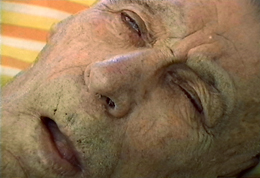Prix Téléfilm Canada de la meilleure découverte Canadienne
(Festival du nouveau Cinéma, Montréal, 1996)
1998 - Colour, Stereo: 3:00 min.
Donigan Cumming calls a "moving still". In fact, the motion in the three-minute shot that this film consists of almost comes to a halt. In close-ups, Cumming shows the face of an old man lying stiffly on a bed, his eyes closed. He swallows with great effort. The camera then moves slowly along his body to his feet, then back to his face. The man swallows again, and it is only then that the viewer notices that this second segment of the shot is the same as the first, only now running backwards. The shot has come full circle, and the back and forth motions override each other. Thus the continuously advancing filmic image reveals itself to be an optical illusion. Cumming also calls filmic representation into question in the relationship between image and sound. When the camera zooms into the open mouth, a song can be heard from off-camera as if the old man were singing karaoke, yet his lips do not move. In , the image and sound don't allow themselves to be united, except for the point where the old man, as if in step with the music, gently moves his feet: an ironic punch-line in Cumming's complex film about filmic deception.
